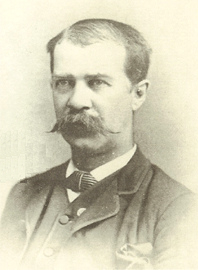Dyer Lum
Dyer Daniel Lum (born February 15, 1839 in Geneva , New York , † April 5 or 6, 1893 in New York City ) was an American anarchist and poet . He was a leading anarcho-syndicalist and life partner and mentor of early anarcho- feminist Voltairine de Cleyre .
Lum was a prolific writer and wrote some of the core pieces of American anarchism . He wrote in the magazines Mother Earth , Twentieth Century , Liberty ( Benjamin Tucker's individual anarchist magazine), The Alarm ( IAA magazine ) and The Open Court . After Albert Parson's arrest , Lum published The Alarm from 1892 to 1893.
Life
Lum came from the Tappan family (see Benjamin Tappan ); his grandfather was a revolutionary and worked for Samuel Gompers . Hoping to end slavery , he volunteered in the Northern Forces during the Civil War . He served in the Fourteenth New York Cavalry and later fought as a captain in the Red River Campaign. As a trained bookbinder, he became an activist of the labor movement after the end of the Civil War and ran for lieutenant governor of Massachusetts in 1876 together with the abolitionist Wendell Phillips .
Lum came to prominence in 1877 when he was traveling the United States for a while as Secretary of the Congressional Committee investigating the Depression of Labor . Between 1880 and 1892 he championed violence and the trade union movement, and in later years was a driving force in support of Alexander Berkman after his assassination attempt on Henry Clay Frick .
Lum killed himself at the Summit Hotel in Manhattan in 1893 after suffering from severe depression. In contemporary anarchist magazines, the reason for his death was given as fatty heart.
Relationship with de Cleyre
When Lum met Voltairine de Cleyre he was 27 years older than her and had a long life. They formed an unshakable friendship, and Lum had a profound influence on Voltairine de Cleyre's political development, which had drawn from a different stream. She was originally a strict individualist and through him quickly showed solidarity with the radical labor movement and called for panarchist anarchism without adjectives . Their relationship ended after five intense years without their planned collaborative project, an in-depth social and political anarchist novel, being published.
Participation in the Haymarket Affair
Lum was closely associated with and collaborated with the martyrs of the Haymarket Affair in Chicago in 1886. In an essay from 1891, he wrote that August Spies had sent the militants a message asking them not to bring weapons to the Haymarket. This instruction was not followed. Lum wrote "a man disregarded the invitation to be self-determined at all times, acted on his own responsibility and preferred to slaughter himself rather than obey the spiritual commandment than to be 'led a lamb to the slaughter'" Lum assured the eight defendants that none of the bombs were thrown and did not know his identity, although two of them, George Engel and Adolph Fischer , were probably known , according to Paul Avrich . Lum's report mentions that the name of the bomb thrower "was never mentioned in court and is still unknown to the public to this day." Paul Avrich testified that Lum made Albert Parsons disapprove of leniency and planned to use explosives from the Cook to kill the captured anarchists. Liberate county jail. According to de Cleyre, he later supported Louis Lingg's suicide by smuggling the necessary explosives into his cell, hidden in a cigar.
Think
Lum's political philosophy was a combination of individual anarchist economy - a radicalized form of laissez-faire economy inspired by the Boston anarchists - and radical union organization, similar to that of the contemporary Chicago anarchists. Lum's ideas have been variously described as either individual anarchist, syndicalist, mutualist , anarcho-communist, and adjective anarchism. Herbert Spencer and Pierre-Joseph Proudhon strongly influenced Lum's individualistic tendencies. He developed a mutualist union-oriented theory, was active with the Knights of Labor and later advocated anti-political strategies for the American Federation of Labor .
Disappointments with abolitionism, spiritualism and reformism led Lum to turn to anarchism and radicalize workers. He was convinced that in a revolution militant struggles between the working and the owning classes were inevitable, and so he volunteered in the armed forces of the northern states in the hope of ending slavery.
Works
- Dyer Lum: Social Problems of Today Or The Mormon Question in Its Economic Aspects: A Study of Co-operation and Arbitration in Mormondom, from the Standpoint of a Wage-worker. 1886
- Dyer Lum: The Economics of Anarchy - A Study of the Industrial Type. 1890
literature
- Frank Hans Brooks: Anarchism, Revolution, and Labor in the Thought of Dyer D. Lum: "Events Are The True Schoolmasters". 1988, OCLC 39696813 .
Web links
- Works by and about Dyer D. Lum in WorldCat (English)
- Dyer D. Lum on Anarchy in the Anarchy Archives (English)
Remarks
- ↑ James Joseph Martin: Men Against the State . Ludwig von Mises Institute, 1953, ISBN 978-1-61016-391-0 , p. 259 ( limited preview [accessed July 19, 2019]).
- ↑ Original one man disobeyed that order; always self-determined, he acted upon his own responsibility, preferring to be prepared for resistance to onslaught rather than to quietly imitate the spiritual "lamb led to slaughter".
- ↑ Original: was never mentioned in the trial and is today unknown to the public.
| personal data | |
|---|---|
| SURNAME | Lum, Dyer |
| ALTERNATIVE NAMES | Lum, Dyer Daniel (full name) |
| BRIEF DESCRIPTION | American anarchist and poet |
| DATE OF BIRTH | February 15, 1839 |
| PLACE OF BIRTH | Geneva (New York) |
| DATE OF DEATH | April 5, 1893 or April 6, 1893 |
| Place of death | New York City |
